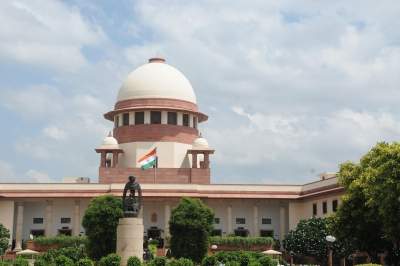
New Delhi (IANS) The Supreme Court on Tuesday said nobody should throttle dissent and people should be encouraged to question as dissent is an important facet of democracy.
A bench comprising Justices L. Nageswara Rao and Deepak Gupta made this observation during hearing on a plea by an NGO, India Social Action Forum (INSAF), challenging the constitutional validity of Section 5 (1) and 5 (4) of the Foreign Contribution (Regulation) Act (FCRA), 2010 and other rules. These gave Centre unchecked and unbridled powers to categorize virtually any organization as "organization of political nature, not being a political party", and thereby denying foreign contribution.
"You cannot throttle dissent. People should be encouraged to question, as dissent is an important facet of democracy", observed the bench.
The petitioner represented by senior advocate Sanjay Parekh contended the provisions in the FCRA violated fundamental rights in Articles 14, 19 (1) (a), 19 (1) (c) and 21 of the Constitution.
The NGO moved the top court challenging the Delhi High Court, which dismissed its plea in 2011. Parekh contended before the apex court that in the main provision under FCRA, vague expressions have been given to certain activities, and "instead of defining those activities, the canvas of vagueness has been expanded thereby resulting in arbitrariness and violation of constitutional parameters".
The court noted, "Nobody stops an organization from getting foreign funds except it is of political nature."
Centre's counsel Additional Solicitor General K.M. Natraj, advocates Shradha and Devashish Bharuka contested this argument stating rules cannot be declared as ultra vires of the Act.
The Centre contended its petitioner apprehension that there would be an abuse of power and some organizations may be unnecessarily harassed. Also, the procedure of declaring the association political, of any organization receiving foreign funds, has been prescribed in the FCRA.
The court observed that political parties are not allowed to get foreign funds, and queried the Centre on the nature of political rights in connection with an organization.
"Rights are so interwoven that it may become political rights. We want to understand political rights. We are concerned with organization of political nature", the court queried the Centre's counsel.
The apex court cited an example that an organization may not have political objective, but through its policies or acts, it may indirectly support a political cause. "Political interest is a wide term... a group formed for the advancement of their interests, its main objective is not political. Would it mean it is not political?" the court put out this query.
The court also raised queries on organizations whose objective is to raise public issues, and whther those could it be termed political. The apex court has reserved the order on this matter.
.